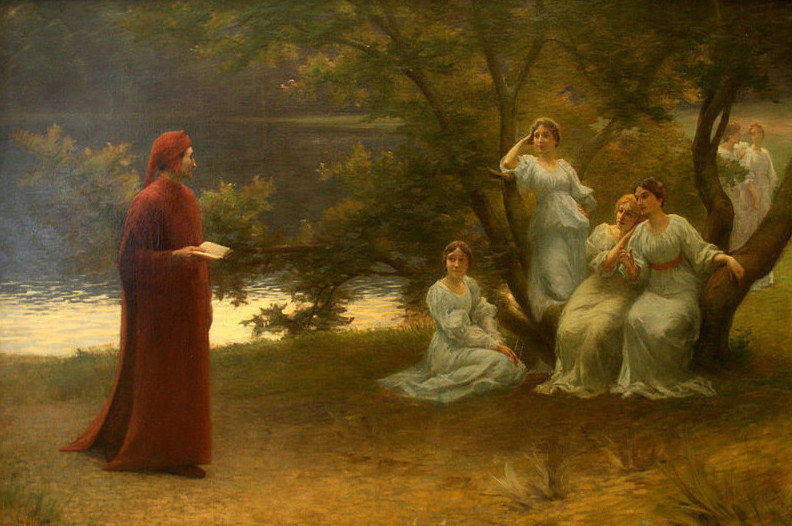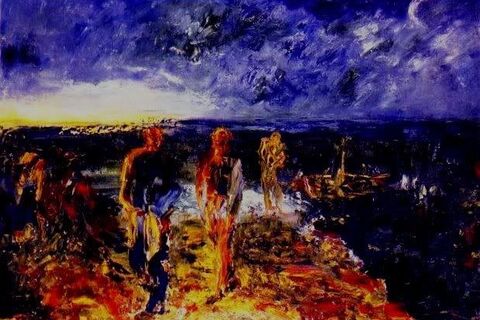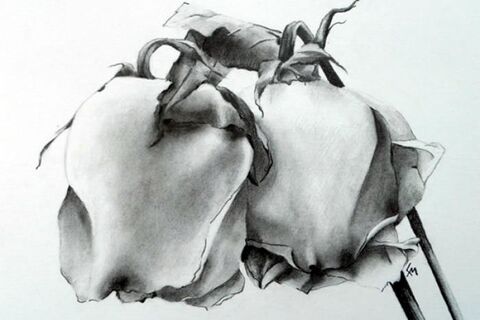The Apotheosis of Solitude

PART IV: Selene
For days I remained within the confines of my room; quiet, morose contemplation with the curtains drawn. The nights were spent in fitful, fretting on my narrow bed. Sleep eluded me. Food repelled me. One poem compelled me. I turned it over and over in my mind; read it over and over to ensure that none of it had escaped my memory. None had.
Ah, what can ail thee, wretched wight,
Alone and palely loitering;
These words were hardly applicable anymore. I hadn’t loitered, palely or otherwise, since the night I flew from the bar; the lash of Solitude’s words driving me on. Though I was alone; so very desperately alone, as I have always been.
Am I the wretched wight of Keats’ poem? Am I the poet describing his plight?
I stare at the open email account; fabricated in the name of the false pilgrim. The email may have been a mistake; I cannot find an appropriate response anyway. The cruel, drunken laughter and Solitude’s steel-hard words refuse to be drowned out by Keats’ mournful imagery and incomplete, Sapphic rhythm.
I stare at an empty page, which obstinately refuses the fresh ink of a new sonnet, one further missive to my lady…in verse. The days and nights slip by and the silence in my room becomes overbearing. The continuing silence in my mind, unnerving.
What little comfort I drew from Keats fades and I am left with the scene in the bar, playing itself over and over in the vivid theatre of memory. Solitude’s relentless castigations hung in the air above my bed; the image of her once delicate lips contorted in a square of anger struck me each time I closed my eyes, each time I so much as blinked. Night after terrible night her words barrelled through my mind and her image assaulted my eyes, until I could take it no longer.
Then, after several nights like this, after more than I choose to count; another, older, sweeter memory returned. That first night; that first smile: that first greeting. That first song; she bathed in the light of the stage, me shrouded in the darkness of my fearful dreams. I remembered then those first stirrings which compelled me to put pen to paper.
I rose from my bed. I sat at my desk. I wrote my third sonnet; Peregrino’s third missive to Solitude.
Sonnet III ~ Solitude Invictus
Am I the pilgrim or the poet? Am I the lovesick boy (the wretched wight?) stuffing a fresh sonnet into an envelop and addressing it to his lady; or am I the author recounting, from memory, a tale I heard, or embellished, or invented?
When he came to recount his new life in love with his Beatrice; Dante set to copy some words from his Book of Memory. He may have set down the substance of the matter, but not all of it. What remained untold? What did he leave out?
And what has, here, begun for me?
Even now, with my imperfect knowledge of all that subsequently transpired and the hand and part that I took in it, I do not know. I simply do not know.
What remains to be told…
I thought the third sonnet would be my last. Even as I addressed the envelop; having procured her postal address by less than honourable means: I thought that the story would end there. I had no intention of returning to the bar to hear her sing, no wish to email her again and, considering that our first encounter in the street was nothing more than coincidence and happenstance, no reason to think that I would bump into her again. It wasn’t as if we moved in the same circles.
It was around this time that I posted a notice on the boards of a nearby college (with a notoriously poor poetry course) advertising my services as a private poetry tutor; in an increasing need to supplement my meagre income. I had one response…one!
Selene was young, sweet, and possessed of the largest, most trusting eyes I have ever seen outside of a dog pound on the day they, regretfully, take the unwanted puppies to the room with the needle. She had been struggling with an essay on Keats and my elegantly scrawled index card on the notice board had been a godsend (her words).
We discussed, at length, La Belle Dame sans Merci; it was partly these discussions which placed the poem so firmly in my mind during those days: and I explained how the seemingly incomplete metrical structure (derived from the odes of Sappho) not only mirrored the sense of loss and bewilderment in the poem, but also showed that Keats was nothing short of a genius.
The word genius has lost all meaning, I find; mostly because it has been debased by being applied to all and sundry. If a former art school brat rips up all her underclothes, smears them with her own menstrual blood and faeces, piles the remnants in a heap in the middle of a gallery floor and strews them with pages torn from a Germaine Greer book…she’s a genius!
If a troubled hack vomits onto the page a torrent of nonsense words, meandering sentences and non sequiturs, gets it published and has the good sense to die a painful and lonely death…he’s a genius!
If a sub-literate footballer makes an athletically unlikely leap and kicks a ball into a net in the process; provided that this is witnessed by millions of (mostly) men and the footballer is being paid an annual salary which would dwarf the gross national product of a medium sized African country…he’s a bloody genius!!
The Oxford English Dictionary defines the word genius as a person having exceptional natural ability. The German philosopher Arthur Schopenhauer was a little more circumspect. He said: Talent hits a target that others can’t hit. Genius hits a target that others can’t see.
Personally, I prefer Schopenhauer’s definition…if only because it quite literally rules out the footballer!!
After our third tutorial session, I told Selene that I no longer required payment. She protested, of course, but I found that I enjoyed our conversations so much that I could not, in good conscience, charge her for the privilege. Long past the allotted tutorial hour, we would talk oblivious to the clock. We talked about poetry and the lives of the poets. Selene had a particular (perhaps ubiquitous?) fascination with Emily Dickinson. She adored the strange-seeming simplicity (again…her words) of the poetry and the quiet, self-sequestered life of the poetess.
She was too polite to ever say it; but I think Selene saw something of Dickinson’s life in the way I, myself, lived. I would catch her, in odd lulls in our conversations, looking at me askance; a sad, strange glaze on her eyes: as though she, somehow, both pitied and revered the way I had chosen to live.
Not long into our friendship; and it had become that…a friendship: we discovered our mutual love for the operas of Giacomo Puccini. Thereafter, our increasingly frequent tutorials/conversations would end with what we came to refer to as ‘Puccini & chips’.
We sat on the floor of my room listening to one of my mother’s old Puccini records and eating from two large bags of vinegar-soaked chips from a van down the street. Selene always insisted on buying the chips; she still felt bad for not paying me for the tutorials. I told her that I enjoyed our conversations immensely and didn’t need the money. Secretly, I hoped that other, less agreeable, students would answer my ad and cover the burgeoning overdraft that was paying most of my living expenses.
Selene was the first and only person I ever invited into my cramped and book-lined rooms. I could always tell when a particular passage of poetry, or more increasingly, music affected her. She would stop munching (she always seemed hungry!), stop fidgeting, stop breathing nearly; stillness would take complete possession of her as the arching melodies filled the room. The first time we listened to La Boheme together, immediately after the final bars, she excused herself and retreated to the bathroom for some twelve or fourteens minutes. When she returned, she packed up her cold and barely touched bag of chips and said a quiet ‘goodnight’. She’d been weeping.
That night, I resolved to introduce her to Dante. Not Divine Comedy, it was far too early for that; but I thought she might enjoy La Vita Nuova.
End of Part IV.
Like 3 Pin it 0



Comments
I think you've hit the target where others can't see....Well done...bring it on!
Jason I love how your sonnets fit so beautifully.
An integral part of the story
I guess a common interest of poetry with him and Selene
is taking his mind a little off the pursuit of solitude
I love your explanation of how some people are perceived to
be a genius They made me smile
Will look forward to the next sonnet if there is one? and next chapter
Great work!
Best wishes Debs
absolutely gorgeous sonnet. I look forwards to your masterpieces